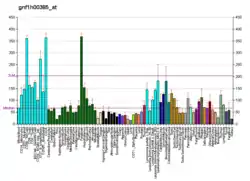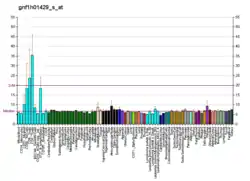EXOC4
Exocyst complex component 4 is a protein that in humans is encoded by the EXOC4 gene.[5][6][7]
Function
The protein encoded by this gene is a component of the exocyst complex, a multiple protein complex essential for targeting exocytic vesicles to specific docking sites on the plasma membrane. Though best characterized in yeast, the component proteins and functions of exocyst complex have been demonstrated to be highly conserved in higher eukaryotes. At least eight components of the exocyst complex, including this protein, are found to interact with the actin cytoskeletal remodeling and vesicle transport machinery. The complex is also essential for the biogenesis of epithelial cell surface polarity. Alternate transcriptional splice variants, encoding different isoforms, have been characterized.[7]
Interactions
EXOC4 has been shown to interact with:
References
- GRCh38: Ensembl release 89: ENSG00000131558 - Ensembl, May 2017
- GRCm38: Ensembl release 89: ENSMUSG00000029763 - Ensembl, May 2017
- "Human PubMed Reference:". National Center for Biotechnology Information, U.S. National Library of Medicine.
- "Mouse PubMed Reference:". National Center for Biotechnology Information, U.S. National Library of Medicine.
- Nagase T, Kikuno R, Hattori A, Kondo Y, Okumura K, Ohara O (Feb 2001). "Prediction of the coding sequences of unidentified human genes. XIX. The complete sequences of 100 new cDNA clones from brain which code for large proteins in vitro". DNA Res. 7 (6): 347–55. doi:10.1093/dnares/7.6.347. PMID 11214970.
- Inoue M, Chang L, Hwang J, Chiang SH, Saltiel AR (Apr 2003). "The exocyst complex is required for targeting of Glut4 to the plasma membrane by insulin" (PDF). Nature. 422 (6932): 629–33. doi:10.1038/nature01533. hdl:2027.42/62982. PMID 12687004. S2CID 4395760.
- "Entrez Gene: EXOC4 exocyst complex component 4".
- Sans N, Prybylowski K, Petralia RS, Chang K, Wang YX, Racca C, Vicini S, Wenthold RJ (Jun 2003). "NMDA receptor trafficking through an interaction between PDZ proteins and the exocyst complex". Nat. Cell Biol. 5 (6): 520–30. doi:10.1038/ncb990. PMID 12738960. S2CID 13444388.
- Riefler GM, Balasingam G, Lucas KG, Wang S, Hsu SC, Firestein BL (Jul 2003). "Exocyst complex subunit sec8 binds to postsynaptic density protein-95 (PSD-95): a novel interaction regulated by cypin (cytosolic PSD-95 interactor)". Biochem. J. 373 (Pt 1): 49–55. doi:10.1042/BJ20021838. PMC 1223477. PMID 12675619.
Further reading
- Hsu SC, TerBush D, Abraham M, Guo W (2004). "The exocyst complex in polarized exocytosis". Int. Rev. Cytol. International Review of Cytology. 233: 243–65. doi:10.1016/S0074-7696(04)33006-8. ISBN 9780123646378. PMID 15037366.
- Kee Y, Yoo JS, Hazuka CD, Peterson KE, Hsu SC, Scheller RH (1998). "Subunit structure of the mammalian exocyst complex". Proc. Natl. Acad. Sci. U.S.A. 94 (26): 14438–43. doi:10.1073/pnas.94.26.14438. PMC 25013. PMID 9405631.
- Grindstaff KK, Yeaman C, Anandasabapathy N, Hsu SC, Rodriguez-Boulan E, Scheller RH, Nelson WJ (1998). "Sec6/8 complex is recruited to cell-cell contacts and specifies transport vesicle delivery to the basal-lateral membrane in epithelial cells". Cell. 93 (5): 731–40. doi:10.1016/S0092-8674(00)81435-X. PMID 9630218. S2CID 6747965.
- Hsu SC, Hazuka CD, Roth R, Foletti DL, Heuser J, Scheller RH (1998). "Subunit composition, protein interactions, and structures of the mammalian brain sec6/8 complex and septin filaments". Neuron. 20 (6): 1111–22. doi:10.1016/S0896-6273(00)80493-6. PMID 9655500. S2CID 10915358.
- Hartley JL, Temple GF, Brasch MA (2001). "DNA cloning using in vitro site-specific recombination". Genome Res. 10 (11): 1788–95. doi:10.1101/gr.143000. PMC 310948. PMID 11076863.
- Wiemann S, Weil B, Wellenreuther R, Gassenhuber J, Glassl S, Ansorge W, Böcher M, Blöcker H, Bauersachs S, Blum H, Lauber J, Düsterhöft A, Beyer A, Köhrer K, Strack N, Mewes HW, Ottenwälder B, Obermaier B, Tampe J, Heubner D, Wambutt R, Korn B, Klein M, Poustka A (2001). "Toward a catalog of human genes and proteins: sequencing and analysis of 500 novel complete protein coding human cDNAs". Genome Res. 11 (3): 422–35. doi:10.1101/gr.GR1547R. PMC 311072. PMID 11230166.
- Simpson JC, Wellenreuther R, Poustka A, Pepperkok R, Wiemann S (2001). "Systematic subcellular localization of novel proteins identified by large-scale cDNA sequencing". EMBO Rep. 1 (3): 287–92. doi:10.1093/embo-reports/kvd058. PMC 1083732. PMID 11256614.
- Brymora A, Valova VA, Larsen MR, Roufogalis BD, Robinson PJ (2001). "The brain exocyst complex interacts with RalA in a GTP-dependent manner: identification of a novel mammalian Sec3 gene and a second Sec15 gene". J. Biol. Chem. 276 (32): 29792–7. doi:10.1074/jbc.C100320200. PMID 11406615.
- Polzin A, Shipitsin M, Goi T, Feig LA, Turner TJ (2002). "Ral-GTPase influences the regulation of the readily releasable pool of synaptic vesicles". Mol. Cell. Biol. 22 (6): 1714–22. doi:10.1128/MCB.22.6.1714-1722.2002. PMC 135608. PMID 11865051.
- Vega IE, Hsu SC (2003). "The septin protein Nedd5 associates with both the exocyst complex and microtubules and disruption of its GTPase activity promotes aberrant neurite sprouting in PC12 cells". NeuroReport. 14 (1): 31–7. doi:10.1097/00001756-200301200-00006. PMID 12544826. S2CID 22757290.
- Riefler GM, Balasingam G, Lucas KG, Wang S, Hsu SC, Firestein BL (2003). "Exocyst complex subunit sec8 binds to postsynaptic density protein-95 (PSD-95): a novel interaction regulated by cypin (cytosolic PSD-95 interactor)". Biochem. J. 373 (Pt 1): 49–55. doi:10.1042/BJ20021838. PMC 1223477. PMID 12675619.
- Sans N, Prybylowski K, Petralia RS, Chang K, Wang YX, Racca C, Vicini S, Wenthold RJ (2003). "NMDA receptor trafficking through an interaction between PDZ proteins and the exocyst complex". Nat. Cell Biol. 5 (6): 520–30. doi:10.1038/ncb990. PMID 12738960. S2CID 13444388.
- Moskalenko S, Tong C, Rosse C, Mirey G, Formstecher E, Daviet L, Camonis J, White MA (2004). "Ral GTPases regulate exocyst assembly through dual subunit interactions". J. Biol. Chem. 278 (51): 51743–8. doi:10.1074/jbc.M308702200. PMID 14525976.
- Bouwmeester T, Bauch A, Ruffner H, Angrand PO, Bergamini G, Croughton K, Cruciat C, Eberhard D, Gagneur J, Ghidelli S, Hopf C, Huhse B, Mangano R, Michon AM, Schirle M, Schlegl J, Schwab M, Stein MA, Bauer A, Casari G, Drewes G, Gavin AC, Jackson DB, Joberty G, Neubauer G, Rick J, Kuster B, Superti-Furga G (2004). "A physical and functional map of the human TNF-alpha/NF-kappa B signal transduction pathway". Nat. Cell Biol. 6 (2): 97–105. doi:10.1038/ncb1086. PMID 14743216. S2CID 11683986.





